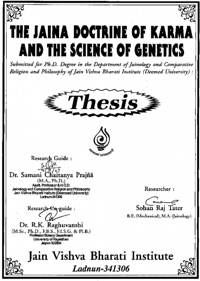Samiti actually means sam + iti = samiti or the right use. Examples include having the right objective, spiritual awareness, the proper discipline, and spiritual vigilance and caution. In this manner, there are 5 sub types of samiti:
- Iryā samiti (careful movements)
This means to move cautiously and carefully, and looking closely on the ground so that no living being must be injured or killed. A monk observes this more carefully and that is why he does not walk around unnecessarily. He walks on the path, which most minimizes violence. Rather than walking on the grass or insects a monk would take an alternate route in order to minimize the violence caused by him, even if the alternate route was longer. A layman should also keep this is mind and should be careful while walking.
- Bhāṣa Samīti (careful speech)
One should limit or completely avoid speaking any thing which may provoke violence, flattery, condemnation, gossip etc. or use words that may cause harm to others. One should not inflict pain by using words which are filthy or abusive. One should also limit or deter uttering unpleasant and thoughtless ideas which are contrary to the principles taught by the Jina or scripture that can provoke wrong belief. One's words or speech must be kind and gentle. If anyone has confessed to a monk about his wrong activities or sins, then the monk must not speak about this to others. This samiti also reminds us that one must not frighten anyone, or preach a false doctrine.
- Eṣaṇā Samiti (carefulness about taking food)
Caution must also be paid about all matters relating to food. A monk should go for alms to various houses and should take a small portion of allowable food from each place so that the layman, from whom the food is taken, does not have to be cooked again. Also monk should not take any raw vegetable, raw seeds or any food which has been in contact with living beings, including those taken from a burning stove, oven or even a refrigerator. A monk should not go for alms if it is raining and should not accept any food brought for him. There are fourty two faults which monk must avoid while accepting alms. A layman should also retain from committing a sin in the offering of food to monks. All intoxicated and forbidden food are not to be taken by either monk or laymen.
- Ādāna nikṣepa samiti (carefulness about putting clothes and other things on)
A monk should take the utmost care, before using clothes, to make sure that there are no insects in the folds which may be crushed, hurt or killed. Care must be taken before taking and putting away vessels, books, or sitting down etc. Similar precautions should also be taken by layman.
- Pariṣthāpana Samiti (carefulness about disposal of excreta)
One should be very careful about how, and where one disposes of trash, refuse or excretions so that no harm is done to even the minute insects or bugs. A monk must never keep either food or water overnight, but must rather dispose of them carefully as mentioned above.
 Prof. Dr. Sohan Raj Tater
Prof. Dr. Sohan Raj Tater
 Doctoral Thesis, JVBU
Doctoral Thesis, JVBU